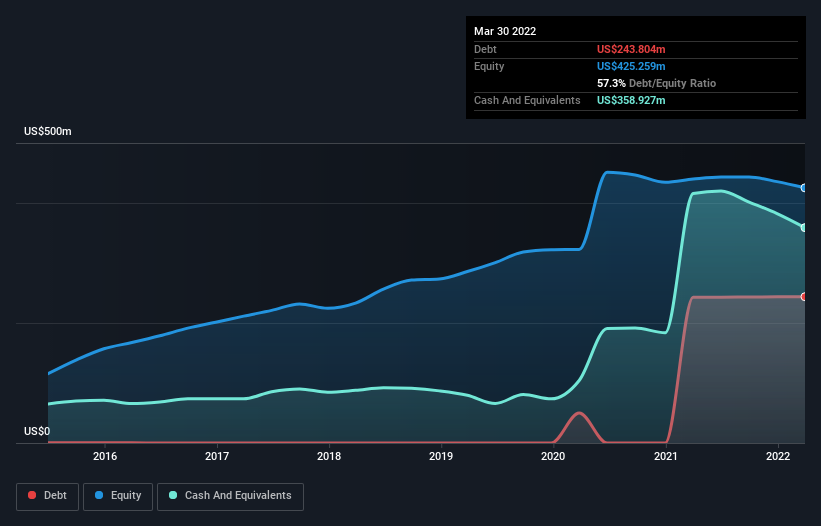
Warren Buffett famously said, 'Volatility is far from synonymous with risk.' So it seems the smart money knows that debt - which is usually involved in bankruptcies - is a very important factor, when you assess how risky a company is. As with many other companies Shake Shack Inc. (NYSE:SHAK) makes use of debt. But the more important question is: how much risk is that debt creating?
What Risk Does Debt Bring?
Generally speaking, debt only becomes a real problem when a company can't easily pay it off, either by raising capital or with its own cash flow. In the worst case scenario, a company can go bankrupt if it cannot pay its creditors. However, a more usual (but still expensive) situation is where a company must dilute shareholders at a cheap share price simply to get debt under control. By replacing dilution, though, debt can be an extremely good tool for businesses that need capital to invest in growth at high rates of return. The first step when considering a company's debt levels is to consider its cash and debt together.
Check out our latest analysis for Shake Shack
How Much Debt Does Shake Shack Carry?
As you can see below, Shake Shack had US$243.8m of debt, at March 2022, which is about the same as the year before. You can click the chart for greater detail. However, it does have US$358.9m in cash offsetting this, leading to net cash of US$115.1m.

How Healthy Is Shake Shack's Balance Sheet?
Zooming in on the latest balance sheet data, we can see that Shake Shack had liabilities of US$126.0m due within 12 months and liabilities of US$898.5m due beyond that. On the other hand, it had cash of US$358.9m and US$11.8m worth of receivables due within a year. So its liabilities total US$653.8m more than the combination of its cash and short-term receivables.
This deficit isn't so bad because Shake Shack is worth US$1.77b, and thus could probably raise enough capital to shore up its balance sheet, if the need arose. But it's clear that we should definitely closely examine whether it can manage its debt without dilution. Despite its noteworthy liabilities, Shake Shack boasts net cash, so it's fair to say it does not have a heavy debt load! When analysing debt levels, the balance sheet is the obvious place to start. But ultimately the future profitability of the business will decide if Shake Shack can strengthen its balance sheet over time. So if you want to see what the professionals think, you might find this free report on analyst profit forecasts to be interesting.
In the last year Shake Shack wasn't profitable at an EBIT level, but managed to grow its revenue by 47%, to US$788m. Shareholders probably have their fingers crossed that it can grow its way to profits.
So How Risky Is Shake Shack?
Statistically speaking companies that lose money are riskier than those that make money. And in the last year Shake Shack had an earnings before interest and tax (EBIT) loss, truth be told. Indeed, in that time it burnt through US$50m of cash and made a loss of US$20m. With only US$115.1m on the balance sheet, it would appear that its going to need to raise capital again soon. With very solid revenue growth in the last year, Shake Shack may be on a path to profitability. Pre-profit companies are often risky, but they can also offer great rewards. There's no doubt that we learn most about debt from the balance sheet. But ultimately, every company can contain risks that exist outside of the balance sheet. For instance, we've identified 1 warning sign for Shake Shack that you should be aware of.
If, after all that, you're more interested in a fast growing company with a rock-solid balance sheet, then check out our list of net cash growth stocks without delay.
New: Manage All Your Stock Portfolios in One Place
We've created the ultimate portfolio companion for stock investors, and it's free.
• Connect an unlimited number of Portfolios and see your total in one currency
• Be alerted to new Warning Signs or Risks via email or mobile
• Track the Fair Value of your stocks
Have feedback on this article? Concerned about the content? Get in touch with us directly. Alternatively, email editorial-team (at) simplywallst.com.
This article by Simply Wall St is general in nature. We provide commentary based on historical data and analyst forecasts only using an unbiased methodology and our articles are not intended to be financial advice. It does not constitute a recommendation to buy or sell any stock, and does not take account of your objectives, or your financial situation. We aim to bring you long-term focused analysis driven by fundamental data. Note that our analysis may not factor in the latest price-sensitive company announcements or qualitative material. Simply Wall St has no position in any stocks mentioned.
About NYSE:SHAK
Shake Shack
Owns, operates, and licenses Shake Shack restaurants (Shacks) in the United States and internationally.
Reasonable growth potential with adequate balance sheet.
Market Insights
Community Narratives



